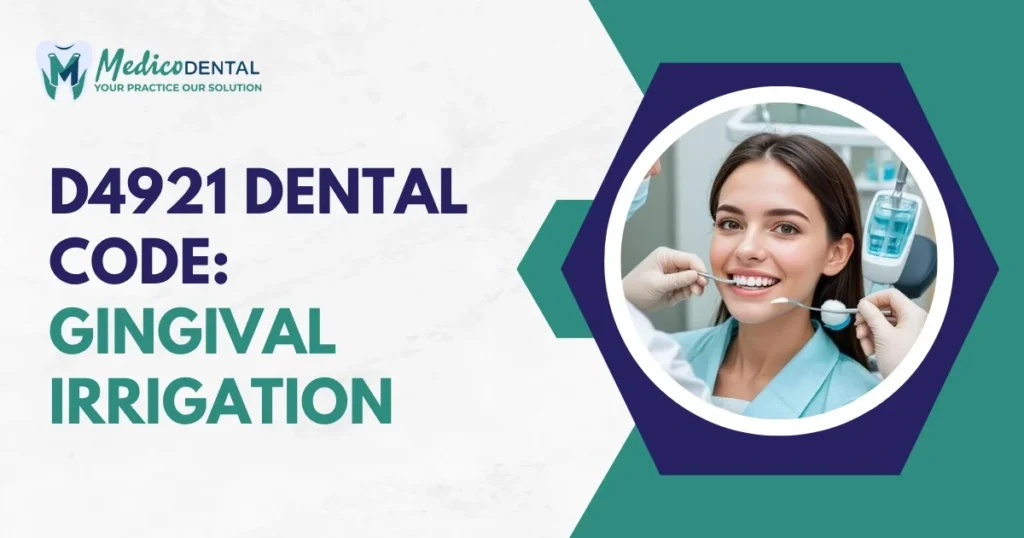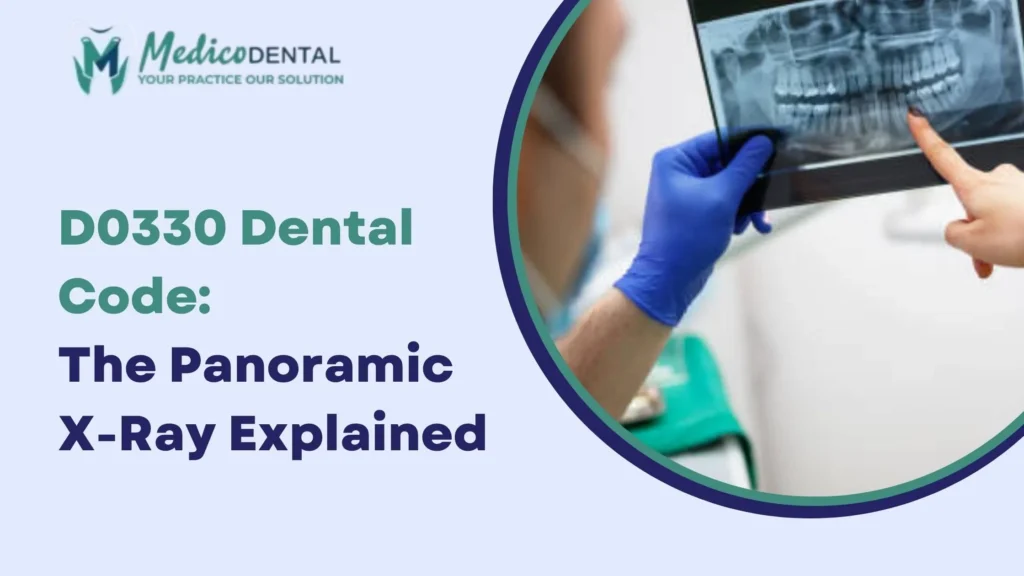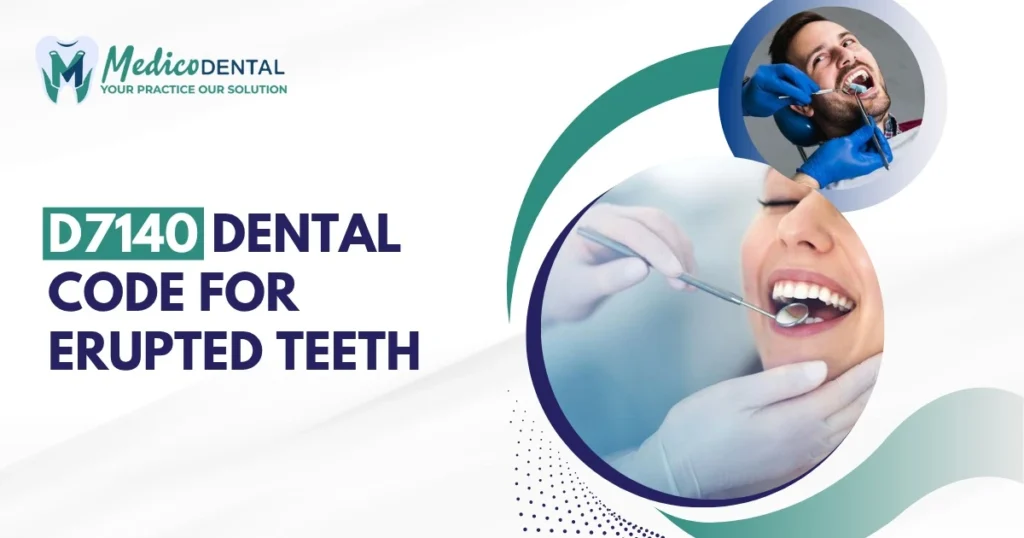Maintaining healthy gums is essential for overall oral health, and sometimes routine cleaning isn’t enough to combat deeper issues. The D4921 dental code represents a professional procedure designed to target and treat gum disease effectively. This procedure, known as gingival irrigation with a medicinal agent, helps reduce bacteria and promote healthier gums, making it a valuable part of periodontal care.
What is the D4921 Dental Code?
Definition and Overview
D4921 is a Current Dental Terminology (CDT) code used to describe gingival irrigation with a medicinal agent on a per-quadrant basis. In simple terms, it involves flushing the gum pockets with a medicated solution, such as an antiseptic or antibiotic, to eliminate harmful bacteria. This procedure is performed by a dentist or dental hygienist and is targeted at areas that are difficult to reach through regular brushing or scaling.
Purpose of the Procedure
The primary purpose of D4921 is to manage and treat periodontal (gum) disease. It helps reduce bacterial load, control inflammation, and create an environment that allows gum tissue to heal. Patients with persistent gum issues, pockets that do not respond to routine cleaning, or those at risk of disease progression benefit most from this targeted treatment.
Indications for D4921
Treating Gingivitis and Periodontitis
Gingivitis and periodontitis are two common gum conditions that can lead to tooth loss if untreated. D4921 is particularly effective for patients showing signs of inflammation, bleeding, or early tissue damage. The medicinal irrigation helps control infection and supports professional periodontal therapy.
Deep Gum Pockets
When gum pockets become deeper than normal, bacteria and plaque can accumulate below the gum line. D4921 targets these hard-to-reach areas, delivering medication directly to the pockets to reduce bacterial colonies and improve gum attachment.
Resistant Periodontal Conditions
Some patients may not respond fully to conventional cleaning or scaling. In such cases, D4921 is indicated as an adjunctive therapy to assist in managing resistant periodontal disease, enhancing the overall success of treatment plans.
Step-by-Step Procedure of D4921
Preparation and Local Anesthesia
Before beginning the procedure, the dentist evaluates the gum health and identifies the areas requiring irrigation. Local anesthesia may be applied in sensitive areas to minimize discomfort during treatment.
Application of Medicinal Agent
A specialized medicinal solution, often an antibiotic or antiseptic, is carefully applied to the affected gum pockets. The agent is designed to reduce bacterial load and promote healing of inflamed tissues.
Tools and Techniques Used for Irrigation
Dental billing and Dental professionals use precision irrigation tools, such as syringe tips or ultrasonic devices, to ensure the solution penetrates deeply into the pockets. The technique ensures thorough cleansing without causing damage to the surrounding gum tissue.
Benefits of Gingival Irrigation (D4921)
Reduction of Bacteria in Gum Pockets
One of the most significant benefits of D4921 is its ability to reduce bacterial levels deep within gum pockets, where regular brushing and flossing cannot reach. This lowers the risk of infection and helps maintain healthier gums.
Promotes Periodontal Health
Regular use of gingival irrigation as part of a comprehensive periodontal plan supports gum tissue regeneration, reduces inflammation, and strengthens the attachment between teeth and gums.
Prevents Disease Progression
By effectively targeting harmful bacteria and promoting healing, D4921 helps prevent the progression of gum disease, reducing the likelihood of advanced periodontitis and tooth loss.
Billing and Insurance for D4921
How D4921 is Billed Per Quadrant
D4921 is billed on a per-quadrant basis, meaning each section of the mouth (upper right, upper left, lower right, lower left) is considered separately. For example, if a patient requires treatment in two quadrants, the procedure would be billed twice. Accurate documentation of which quadrants were treated is essential for insurance claims to avoid underpayment or claim denials.
Insurance Coverage Considerations
Insurance coverage for D4921 may vary depending on the plan. Many dental insurance policies classify gingival irrigation with a medicinal agent as periodontal therapy, which could be partially or fully covered if periodontal disease is diagnosed. Patients should check with their insurance provider and provide supporting documentation from the dentist to ensure coverage.
Common Billing Mistakes to Avoid
Common mistakes include:
- Billing only once when multiple quadrants are treated.
- Misreporting the code or using the wrong periodontal code.
- Failing to document the medical necessity for the procedure.
Proper training for dental staff and meticulous documentation can prevent claim rejections and delays in reimbursement.
Differences Between D4921 and Other Periodontal Codes
D4921 vs. D4910 (Periodontal Maintenance)
D4910 refers to periodontal maintenance, which is a follow-up cleaning for patients with a history of periodontal disease. Unlike D4921, which uses medicinal irrigation for active treatment, D4910 focuses on ongoing maintenance and does not involve direct application of medicated agents into the gum pockets.
D4921 vs. D4341/D4342 (Scaling and Root Planing)
Scaling and root planing (D4341 for four or more teeth per quadrant, D4342 for one to three teeth per quadrant) is a mechanical cleaning that removes plaque and tartar below the gumline. D4921 complements these procedures by delivering medication directly into the pockets, especially in areas where scaling alone may not be sufficient to control bacterial infection.
Patient Scenarios and Real-World Examples
Mild Gingivitis Treatment
For patients with early-stage gingivitis, D4921 can be used to target inflamed gum pockets that show signs of bleeding or plaque buildup. The procedure helps control bacterial growth and can prevent the condition from progressing into periodontitis.
Advanced Periodontitis Management
In cases of advanced periodontitis, D4921 serves as an adjunct therapy alongside scaling, root planing, and other periodontal treatments. Medicinal irrigation reaches deeper pockets that are difficult to clean mechanically, promoting healing and slowing disease progression. Patients often experience reduced inflammation and improved gum attachment after treatment.
Conclusion
D4921 offers targeted gum treatment that effectively reduces bacterial levels, supports healing, and helps prevent the progression of periodontal disease. By reaching areas of the gums that are difficult to clean with regular brushing or scaling, this procedure complements standard dental cleanings and other periodontal therapies, enhancing overall oral health outcomes. For patients, D4921 provides a safe and effective method to manage gum disease, reduce inflammation, and maintain healthy gums. For dentists, ensuring proper documentation, accurate billing per quadrant, and a clear understanding of code differences is essential to achieve successful treatment results while facilitating correct insurance reimbursement.
FAQs
Is D4921 Painful?
Ans. Most patients experience minimal discomfort during gingival irrigation. Local anesthesia can be used for sensitive areas, making the procedure virtually painless. Some patients may feel a slight pressure as the solution is applied into the pockets.
How Often Can Gingival Irrigation Be Done?
Ans. The frequency depends on the severity of gum disease and the dentist’s recommendation. Typically, it may be performed during routine periodontal treatment sessions or as needed for infection control. Regular follow-ups are important to monitor gum health.
Will Insurance Cover D4921?
Ans. Coverage varies by insurance plan. Many dental insurance policies cover D4921 if periodontal disease is diagnosed and documented. It is important to submit proper documentation and preauthorization when required. Patients should confirm with their insurance provider before scheduling treatment.



